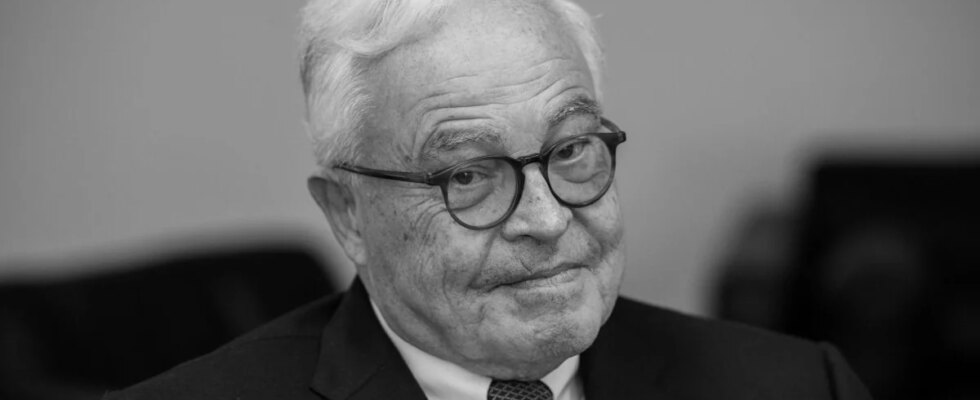“Whatever you can read and hear about it is that the financial sector is not prepared to provide any further external or even own funds on an unchanged basis.” This is one of the most famous sentences in German economic history, and it caused the speaker and his company a lot of trouble. Who said that on February 3, 2002 in an interview with the news agency Bloomberg, was Rolf-Ernst Breuer, then 64 years old and at the peak of his professional career as CEO of Deutsche Bank.
The traditional Deutsche Bank, founded in 1870 before the founding of the German Empire, was on the verge of becoming one of the world’s most important financial institutions around the year 2000, possibly on a par with the big players in the United States and Asia. And Breuer clearly enjoyed the power that this gave him personally. Background discussions with him in the guest house of Deutsche Bank took place in an elegant atmosphere with good food and were worthwhile for journalists. Breuer, correctly dressed in a dark cloth, sat gravely in the middle of the table, explained the world, smiled meaningfully at questions and revealed a lot about what moved him.
Breuer had done something that one is never allowed to do in his position: talk about his customers.
Born in Bonn in 1937, he was a major German banker of the old school. First came a banking apprenticeship, including at Deutsche Bank in Mainz and Munich, then studying law in Lausanne, Munich and Bonn: the best addresses. He received his doctorate in his hometown in 1967, when he was already working in the Karlsruhe branch of Deutsche Bank. While the “Sixty-Eighters” were questioning the state, he made the jump to the corporate headquarters in Frankfurt am Main, to the stock exchange department, which he headed from 1974. In 1985 he became a member of the board, and in 1997 he became spokesman for the board, as it was called there, i.e. boss. In the years that followed, up to 2002, he was one of the most powerful men in the German economy. His numerous positions in business and his contacts gave him influence; he knew almost everything.
2002 was a fateful year for Breuer. Not only because he had to make way for his successor Josef Ackermann, who was even more decisive, knew even more and was even more public. The Ackermann era, which was so brilliant to the outside world, saw the beginning of the major crises, the strategic mistakes, the decline in power of the once so powerful bank, from which it is still struggling to recover. For Breuer personally, 2002 was also a year that he will never forget, because he remembered the aforementioned Bloomberg-Interview, which from then on determined his life, at least in the outside perception.
The issue was the multifaceted company run by entrepreneur Leo Kirch, who was as powerful in the media as Breuer was in the financial world. Deutsche Bank was one of the Kirch Group’s financiers, and so it was a bombshell when the bank’s boss casually repeated in an interview what “everything you can read and hear” about how the Kirch Group was doing financially, namely badly. When the group actually collapsed shortly afterwards, Kirch blamed Breuer and demanded compensation from him and the bank. The experienced banker had done something that one should never do in his position: talk about his customers.
What followed was a bitter legal war in many courts and courtrooms that lasted until 2014. Breuer won and lost. At one point a claim for damages against the bank was confirmed, but not against Breuer personally, then the amount of this claim was reduced, but Breuer was also held personally responsible, and so it went back and forth, with the most expensive lawyers in the republic crossing swords. Leo Kirch had long since died, but Breuer was still in the thick of it and sometimes in the courtroom. There he protested his innocence, saying that he had never wanted to harm Kirch with the interview: “What is being accused of me is outrageous and defamatory.” The court, on the other hand, called his behavior immoral. In the end, the bank had to pay almost a billion euros, it took recourse against its former boss, demanded 3.2 million euros from him, and his manager’s liability insurance had to pay many times that amount. Breuer, along with other top people at Deutsche Bank, was acquitted of the charge of attempted fraud in connection with the Kirch turmoil. It was a first-class acquittal.
At this point, Breuer had also long since lost his position as Chairman of the Supervisory Board of Deutsche Bank, which he had taken over after his time as CEO, as was customary at the time – his grand plan to buy the London Stock Exchange with the Deutsche Börse in Frankfurt, where he was also Chairman of the Supervisory Board, had failed due to opponents in the financial market.
After that, the bank pensioner’s life became quieter. He was involved in the cultural and educational sectors, was spokesman for the University Council of the Johann Wolfgang Goethe University and an honorary senator, chairman of the board of trustees of the Cultural Foundation of the States and much more. It was a late afterglow and a reminiscence of the time when Deutsche Bank was influential in the network called Deutschland AG and centrally involved in society. Today it is still the largest German bank in terms of total assets, but it has no extraordinary ambition in either industry or cultural engagement in the country. On May 22, 2024, as the bank announced on Thursday, Rolf-Ernst Breuer died at the age of 86 “after a long illness with his family.”

